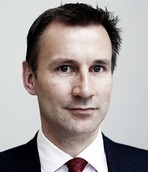Jeremy Hunt vows to tackle 'mediocrity' in NHS following Sir Bruce Keogh’s review
Health Secretary Jeremy Hunt has vowed to tackle “mediocrity and inadequate leadership head on” after a review of 14 NHS hospitals with high mortality rates revealed that care in some settings is “not good enough”.

Sir Bruce Keogh, NHS medical director, was asked to carry out the investigation by the Prime Minister in the wake of the Francis Inquiry earlier this year, which found high levels of neglect at Mid Staffordshire NHS Trust between 2005 and 2009.
The hospitals chosen for review, including Colchester Hospital University NHS Foundation Trust and Buckinghamshire Healthcare NHS Trust, were selected due to their high mortality rates, which acted as a “smoke alarm indicator” to health bosses.
Revealing the findings of his review yesterday, Sir Bruce said not one of the hospitals was “given a clean bill of health” following his investigation but he did not find a disaster on a scale similar to what was found at Stafford Hospital. Instead he found inadequate hospitals trying to meet a series of improvement targets with very little help. Some of the issues he found included a lack of willingness to learn from mistakes and failure to act on information that showed a cause for concern, with specific examples including staff working for up to 12 days in a row without a break and patients being left unmonitored on trolleys for long periods of time.
Sir Bruce said: “High mortality rates do not always point to deaths which could have been avoided but they do act as a ‘smoke alarm’ indicator that there could be issues with the quality of care. That’s why I was asked to carry out a ‘deep dive’ inspection of the care and treatment being provided by each of these trusts.

“Not one of these trusts has been given a clean bill of health by my review teams. These reviews have been highly rigorous and uncovered previously undisclosed problems. I felt it was crucial to provide a clear diagnosis, to write the prescription, and, most importantly, to identify what help these organisations might need to support their recovery or accelerate improvement.
“Mediocrity is simply not good enough and, based on the findings from this review I have set out an achievable ambition which help these hospitals improve dramatically over the next two years.”
As a result of Sir Bruce’s review, Mr Hunt has announced he will place 11 of the 14 hospitals under special measures to improve the care patients receive. He said: “I can announce that 11 hospitals will be placed into special measures to improve patient care. This means that they must implement all of the recommendations and external support will be provided to help them do this. The quality of leadership will be assessed and any senior managers who are not up to the job will be removed. And each hospital will be partnered with high performing NHS organisations to act as mentors.
“Under the new rigorous inspection regime led by the chief inspector of hospitals, if a hospital is not performing as it should, the public will be told. If a hospital is failing, it will be put into special measures with a limited time period to sort out its problems.
“We owe it to the three million people who use the NHS every week to tackle and confront mediocrity and inadequate leadership head on. I would like to sincerely thank Sir Bruce and his team for their extremely difficult and thorough work.”
Responding to Sir Bruce’s review, Chris Ham, chief executive of the King’s Fund said: “[Yesterday’s] review once again highlights that standards of patient care in some hospitals are not good enough, reinforcing the message from the Francis report that quality and safety must be the first priority for all the NHS organisations.

“The reasons for the kind of problems identified by the review are complex, but ultimately reflect poor leadership and a failure to develop the right culture of care at the hospitals identified. Small hospitals also face particular financial challenges and often struggle to secure sufficient staff.
“It is well known that some of the hospitals highlighted in the review have longstanding problems – most of them have already replaced their chief executives and chairs, so removing senior staff is unlikely to deliver the improvements needed. We therefore welcome the review’s recommendations which provide a mixture of intervention and support to help the hospitals identified to improve, for example by establishing partnerships with high performing organisations.”
Mr Ham continued: “The review rightly emphasises the importance of hospital boards making better use of the data to identify potential problems. High mortality rates should be treated with caution, but are an important warning sign. It is also important to look at other indicator especially feedback from patients and staff.
“The review also highlights workforce issues, in particular inadequate staffing levels and a lack of experienced cover at night and at weekends – this emphasises the ongoing challenge for hospitals to provide adequate staff as the financial squeeze bites, especially given emerging recruitment difficulties in some parts of the NHS workforce.
“Responsibility for the quality of care in hospitals ultimately lies with front line staff and with boards – creating the right culture of care must be their top priority so that problems are tackled before investigative action is required.”
Latest News
 29-Jul-24
Dementia Bus gives carehome.co.uk staff insight into life with dementia
29-Jul-24
Dementia Bus gives carehome.co.uk staff insight into life with dementia
 01-Mar-24
Find out the top care homes in 2024
01-Mar-24
Find out the top care homes in 2024
 21-Mar-23
UK's top care homes in 2023 revealed
21-Mar-23
UK's top care homes in 2023 revealed
 03-Jan-23
carehome.co.uk launches free care helpline
03-Jan-23
carehome.co.uk launches free care helpline
 13-Dec-22
5 mins with Emily Whitehurst, chief operating officer for Constantia Healthcare
13-Dec-22
5 mins with Emily Whitehurst, chief operating officer for Constantia Healthcare